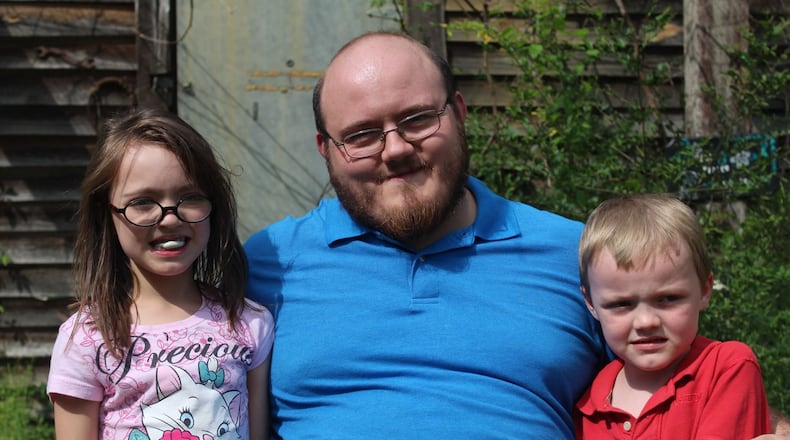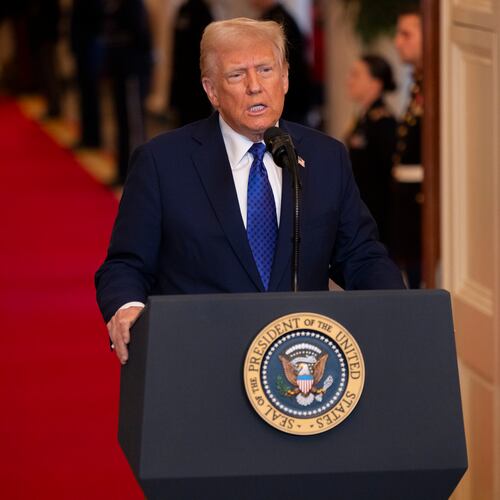I am not at ease, nor am I quiet; I have no rest; but trouble comes. Job 3:26
In the Old Testament Book of Job, the main character has everything. A big family. Servants. Seven thousand sheep. Three thousand camels. Five hundred oxen. Five hundred donkeys. And then, inexplicably, he loses it all.
In this, the Book of Joey, the main character does not have nearly as much. But like Job, Joey Camp suffers an unfair share of misery.
They both get sick. And that is when their stories become even more complicated.
Job was plagued with “loathsome sores” all over his body, according to scripture. An Afghanistan war veteran from Cartersville, Joey contracted the deadly new coronavirus, which knocked him off his feet, sent him to the hospital and landed him in a special quarantine site in a remote part of Georgia.
Enduring years of trauma — poverty, homelessness, the tragic deaths of his loved ones — prepared the former Waffle House cook for his battle with COVID-19, the highly contagious disease that has killed tens of thousands of people around the world, sickened hundreds of thousands of others and put millions out of work.
Joey’s story provides a window into how the virus afflicts impoverished Americans already living on the edge. It also illuminates the contentious debate over how best to stop the disease. Critics have attacked Joey on social media for warning America has overreacted by shutting down much of the service industry where he has made a living.
It is fitting, Joey said, that the Book of Job is his favorite part of the Bible. The story of Satan testing Job’s faith inspires him. He figures that if Job, who suffered through his illness, the loss of his property and the sudden deaths of his seven sons and three daughters, could persevere, then so could he.
“I feel like God does not give us anything that we are not strong enough to handle,” said Joey, 30, a burly and tattooed former Georgia National Guardsman. “And he thinks I am a bad man. He thinks I can handle everything.”
‘Only one way to go and that’s up’
Born in Rome but raised in Villa Rica, Joey was just 4 years old when he and his younger brother, Josh, discovered their father’s body in his bedroom. Alan Camp, an unflinching repo man with a dark sense of humor, had died of a heart attack.
“We were jumping on his back and slapping the back of his head and trying to get him to wake up,” Joey said. “Of course, he is not waking up because he is deceased.”
The boys’ mother, Pamela, worked in the carpet industry and used and sold methamphetamine. She and Alan had an acrimonious relationship and the two split up when their sons were still young. Joey remembers a time when he was 11 and his family — then homeless — lived in a pair of tents at a campsite near Lake Allatoona one summer.
“In hindsight, it looks horrible,” he said. “But it is a very fond, bright memory for me because it was family time. We were all together. One of the things my mom used to always tell me is ‘We may not be rich, but we are rich in family.’ And that was a big thing for me.”
Josh Camp, a medical lab technician from Cartersville who is 14 months younger than Joey, described their tribulations matter-of-factly.
“When you start at the bottom of life,” he said in a text message, “there’s only one way to go and that’s up.”
A childhood fan of wrestling stars “Stone Cold” Steve Austin and “Heartbreak Kid” Shawn Michaels, Joey wrestled at Cass High School in Bartow County. Before graduating in 2007, he joined the Georgia National Guard, driven by patriotism. A few years later, he deployed as a cavalry scout to eastern Afghanistan, where three troops from his unit were killed by a roadside bomb and small arms fire. He knew all of them. Their deaths shook him hard.
Joey had someone waiting for him back home, though. He married his high school sweetheart a year before deploying overseas in 2009. They had three children after he returned from Afghanistan.
Tragedy struck anew in 2012, when Pamela died of ovarian cancer. On Father’s Day of the following year, Joey’s infant daughter died from sudden infant death syndrome. Joey’s marriage eventually collapsed. Estranged from his wife, Joey shares custody of their two children. His two cars were repossessed. He was evicted from two homes.
Joey’s wrestling and military service toughened him for such challenges, said his stepfather, Bobby Ray Cooper Jr., a commercial demolition worker from Bremen.
“He is a good man. His whole persona, his spirit, aura or whatever you want to call it is good. I have never seen evil in Joey, any kind of evil,” Cooper said. “It seems like the harder he tries, the worse deal he gets.”
Attack on Joey’s health
On the morning of March 6, someone placed a large metal box on the door leading into Joey’s room at Northside Hospital Cherokee in Canton. Stocked with medical gowns, gloves and masks for anyone seeking to enter, the box alarmed Joey.
Things had been looking up for him in the months leading up to that day. He started jobs driving a party bus and cooking at a Waffle House in Canton. He made money. His self-esteem rose. Then, amid the cold February weather, the coughing spells started. It was as if he were drowning in his own fluids. He felt pressure in his chest.
Joey first went to an urgent care clinic, where he was tested for the flu, given medication and then sent home. The following day, his condition worsened. He felt feverish and exhausted. A friend took him to the emergency room at Northside. Trembling with chills, Joey brought a blanket for the ride.
The hospital X-rayed his lungs, hooked him up to an oxygen machine and diagnosed him with double pneumonia. Next, the big metal box appeared on his hospital room door. The nurses wore face shields when they entered his room, an ominous sign.
“I knew it was bad,” Joey said. “I knew whatever I had was rough stuff.”
The hospital staff swabbed the inside of his nose and the back of his throat, later confirming he tested positive for COVID-19 and telling him his diabetes had compromised his immune system enough to make him vulnerable to the disease. The news stunned him. He had no idea where he contracted his illness.
State health authorities contacted his friends and relatives, instructing them to quarantine themselves. Joey volunteered to be isolated by the state officials because he was living in Canton with a friend who has an infant son. A driver outfitted with a smock, gloves and a face mask transported Joey in a van to a quarantine site the state had set up for COVID-19 patients at Hard Labor Creek State Park near Rutledge.
For six days, Joey lived alone in a furnished camper trailer in a remote part of the park, roughly 50 miles east of Atlanta. The authorities kept their distance. When they brought him takeout meals — chili dogs from a local restaurant and a grilled chicken sandwich and salad from a Chick-fil-A — they left the food at his door and stepped away.
“I was standing at the door and I have my mask on and they were like six feet away,” he said. “I was like, ‘Oh, so this is how we are going to do this? This is how it is going to be the entire time? OK. Cool.’”
Joey killed time by watching “Star Wars” movies on his phone. He started a video diary but quit after becoming bored with it. Through a telemedicine app on his phone, he began seeing a Department of Veterans Affairs therapist. They spoke about his hypervigilance, hair-trigger temper and depression, symptoms he believes are connected to an undiagnosed case of post-traumatic stress disorder from his childhood and time in Afghanistan.
His isolation suddenly ended. On March 15, state health officials concluded he no longer had a fever or any other symptoms of the disease and should return home. They said he was considered “cured.”
Losses and gains
Journalists across the country have scrambled to report on Joey’s harrowing story. In his interviews with them, Joey urged people to take precautions but also warned the nation was reacting disproportionately to the pandemic, saying: “We have got to stop panicking.”
A Libertarian, Joey voted for Donald Trump for president and plans to vote for him again. At first, Trump’s handling of the pandemic was “too laissez-faire,” Joey said. But the president, Joey said, has improved.
Initially, Trump played down the virus, accused Democrats of using it as a "hoax" against him and said he wanted to reopen the country for business by Easter. He eventually backed off the Easter goal and has soberly announced that following federal health guidelines for fighting the spread of the virus is "a matter of life and death." Still, some experts say Trump has not gone far enough.
“I don’t agree with shutting down bars. I don’t agree with shutting down restaurants,” Joey said. “I don’t agree with shutting down our economy. I agree with commonsense social distancing. If you are part of a high-risk group, stay indoors, avoid people.”
The ridicule was swift and severe on social media. Calling him an “idiot” and a “meathead,” critics accused Joey of being irresponsible and complained he has no business giving advice about the pandemic.
At the same time, Joey said, kind strangers have reached out to him on Facebook and told him they are praying for him. Joey's military health benefits paid for his hospital bills, but he is still deep in debt. The party bus Joey drove has been idled, he said, and the Waffle House in Canton where he cooked doesn't need him anymore amid the economic slowdown. A Cass High School alumna has started a GoFundMe campaign to raise money for his expenses. Another friend found a temporary home for Joey in Cartersville.
A Christian, Joey turned to the Bible for comfort and wisdom as he recovered from the coronavirus, particularly the Book of Job. He does not compare himself to the biblical figure. Job, Joey said, lost much more than him. But Job also gained far more than Joey after enduring his tests and remaining faithful. Money. Gold rings. Twice more livestock than he originally had. Seven more sons and three more daughters.
Joey has benefited in other ways. The six days he spent in quarantine gave him time to reflect on his life, talk to the VA therapist and begin to heal. Sharing his story with journalists has been therapeutic. He hopes publicly talking about his life will help others who are suffering.
He has emerged from his illness with a renewed purpose. Joey dreams of starting his own business making hunting knives, cosplay costumes and movie props. He said he has spent much of his life focusing on surviving. Now he wants to start thriving.
About the Author
Keep Reading
The Latest
Featured







